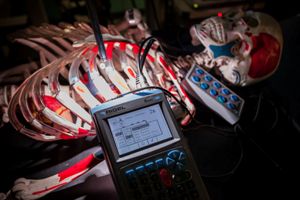Aug 27 2013
A ground breaking project in Poland to create a new generation of advanced cardiac surgery robots is utilising the latest in portable analysers to improve electrical safety testing during product development.
 Rigel Medical’s 288 is being used to improve electrical safety testing on cardiac surgery robots being developed in Poland
Rigel Medical’s 288 is being used to improve electrical safety testing on cardiac surgery robots being developed in Poland
Robin Heart, instigated by the Professor's Zbigniew Religa Foundation of Cardiac Surgery Development, is Europe's first medical robot for cardiac surgery with semi-automatic movements, an advanced human-machine interface and a 3D virtual training system.
There are an estimated four million minimally-invasive surgeries undertaken annually around the world, and the robot technology aims to reduce the risk factor by using advancements in precision robotics to improve surgical accuracy and manoeuvrability.
Ensuring that all the vital electrical components of the robot system function properly and safely during the various stages of product development is a critical part of this research project that could radically alter the future shape of medical surgery.
Testing has to be undertaken in accordance with IEC 60601-1 Medical electrical equipment - Part 1: General requirements for basic safety and essential performance. The components also have to be regularly inspected and tested to make sure they comply with IEC 62353, the standard for in-service and after repair testing of medical electronic devices.
The 288 analyser has been supplied by Rigel Medical’s distributor in Poland, SAMSO, and features multi-lingual menu driven instructions, with download report, for simple operation and test control of all electrical safety tests in manual, semi automatic or fully automatic test modes.
It is the industry’s smallest automatic safety analyser, providing fast and accurate testing of patient, enclosure and earth leakage as well earth continuity and insulation resistance.
The compact design is particularly beneficial for the technicians involved in the Robin Heart project, providing improved portability and ease-of-use during completion of electrical safety checks.
Kamil Rohr, engineer at the Foundation of Cardiac Surgery Development, has been impressed by the reliability and accuracy of the tester.
He said: “It provides a higher degree of measurement accuracy than other testers, while the advanced software is impressive, allowing us in particular to plot trends in measurement values.
“It incorporates a good range of features for a tester of its size, while the connectivity benefits are particularly impressive. The ability to create our own test sequences is particularly useful while we find it easy-to-use and appreciate the fact that it’s compact enough to carry around our research facility.
“The multi-lingual functions are also a beneficial feature, while importing and exporting data capabilities is particularly helpful, enabling us to store test information which can then be easily retrieved and used for audit purposes.”
The 288 offers an accurate solution for testing devices for electrical safety to appropriate standards including IEC/EN 62353, IEC/EN60601-1, VDE 0751-1, AS/NZS 3551, AAMI, NFPA-99, MDA DB 9801-2006.
A compact Bluetooth barcode scanner enables devices and equipment to be quickly and easily identified, while test results can be stored within the Rigel 288 safety analyser and printed wirelessly to the rugged battery operated printer.
Traceability is improved as information can be downloaded into Med-eBase – the easy-to-use asset management software. This enables the user to store and manage test results, email html test certificates to clients and schedule new work orders, which can then be fully uploaded into a large onboard memory.
The compact, lightweight design and long life battery power of the Rigel 288 reduces downtime between tests, making the instrument practical and highly portable for multi-site use. It features easy-to-follow menu driven instructions for ease of operation and test control of all required electrical safety tests in manual, semi automatic or fully automatic test modes.
Users also have the facility to select from a range of preset test programs or develop their own customised routines.
A large internal memory facilitates the storage of test results for safety audit and traceability purposes. In addition, as well as storing the results of electrical tests, there is also the ability to record user defined inspections and measurements from other equipment such as SpO2, NIBP, ECG and other electro medical patient equipment.
Rigel 288 forms part of a comprehensive range of high performance specialist biomedical test equipment supplied by Rigel Medical, part of the Seaward Group. More at www.rigelmedical.com or email [email protected].